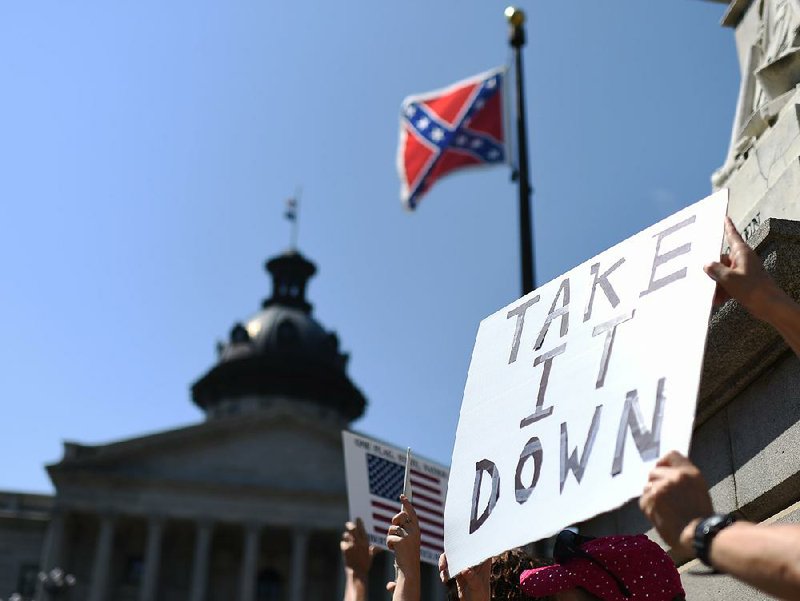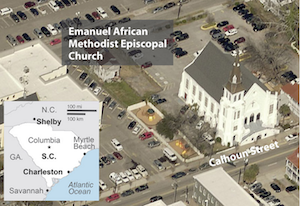COLUMBIA, S.C. -- South Carolina lawmakers voted to consider removing the Confederate flag from their Statehouse grounds, and other politicians took aim at Civil War-era symbols Tuesday, nearly a week after nine black churchgoers were slain in what police called a hate crime.
Prodded by Gov. Nikki Haley's call the day before to move the flag to a museum, lawmakers approved a measure enabling a flag debate by a vote of 103-10 in the House and a voice vote in the Senate.
The House vote drew a standing ovation after Democratic and Republican leaders jointly sponsored the measure. Very few lawmakers rose to say the flag should stay; some said they were saving speeches for the legislative debate later this summer.
Lawmakers then prayed for state Sen. Clementa Pinckney, who joined the Legislature in 1997. Pinckney, who also was pastor of Emanuel African Methodist Episcopalian church in Charleston, was among the dead.
Dylann Storm Roof, 21, who faces murder and gun charges in the church attack, had posed in photos displaying Confederate flags and burning or desecrating U.S. flags.
Haley's call to put the Confederate flag in a museum was quickly seconded by leading Republicans including presidential contenders U.S. Sens. Lindsey Graham of South Carolina and Rand Paul of Kentucky, and Mike Huckabee, with Senate Majority Leader Mitch McConnell also in agreement.
"I think the flag is inescapably a symbol of human bondage and slavery," Paul said. "Particularly when people use it obviously for murder and to justify hatred so vicious that you would kill somebody, I think that that symbolism needs to end."
Huckabee, a former Arkansas governor, said Sunday that the flag debate was "not an issue for a person running for president."
"Now that [the] Republican governor [Haley] has spoken out and has said that it is an awful symbol and she wants it to come down, do you agree with her?" interviewer Ed Henry asked Huckabee on Fox News on Tuesday.
"Absolutely, because that's where it needed to be settled," Huckabee said. "She took leadership of her state, and that's what governors do. She was accompanied by the congressmen, by the senators, by the leaders of the House and Senate. That's where this issue should be, and it is being settled. It shouldn't be settled by The New York Times or a bunch of talking heads from the Washington roundtable. It ought to be decided by the people who live in that state."
Many in South Carolina cited the church slayings as they abandoned the long-held position that even debating the status of the flag would be too racially divisive.
"Last week's terrorizing act of violence shook the very core of every South Carolinian," South Carolina House Speaker Jay Lucas said in support of the measure.
The first South Carolina senator to take the floor and call for moving the flag to a museum was the son of the state's most powerful politician of the past century, U.S. senator and segregationist Strom Thurmond, whose statue stands on the side of the Statehouse opposite the Confederate flag.
State Sen. Paul Thurmond said the church attack compels flag supporters to reconsider. The Charleston Republican said he loves his ancestors but isn't proud of a heritage that included holding people in bondage, and he wants to send a strong message to anyone contemplating a hate crime.
"I can respond with love, unity and kindness," Thurmond said, "and maybe show others that the motivations for a future attack of hate will not be tolerated, will not result in a race war, will not divide us, but rather strengthen our resolve to come together."
Outside in the sweltering heat, where hundreds chanted "bring it down, bring it down," civil-rights activist Kevin Gray said it's time to stop using the word "victims" to describe the people slain -- they are martyrs, he said, and if Confederate symbols come down around the South, the churchgoers' deaths will not have been in vain.
There were some dissenting voices in the crowd that gathered next to the Confederate monument where the flag flies atop a 30-foot pole in front of the Statehouse, in full view of the U.S. and state flags flying at half-staff.
"This flag is heritage. If you take it down, you won't get rid of racism. The flag didn't pull the trigger. The flag didn't kill anybody. That was an individual that did that," said Mark Garman, 56, who like Roof is from Eastover.
The Confederate battle flag was placed atop the Statehouse dome in 1961 for the 100th anniversary of the beginning of the Civil War, and lawmakers decided in 1962 to keep it there in response to the civil-rights movement.
After mass protests, a smaller, square version was moved to the flagpole out front in 2000. The legislature at the time ordered that any change in the display of the flag require a two-thirds vote in each chamber.
Najee Washington, granddaughter of shooting victim Ethel Lance, said swift action on the flag would mean a lot to her family.
"That would be great," she said. "It's just a part of the past that we don't need to be reminded of every day."
States weigh in
Other states moved quickly to address their own Civil War-era symbols.
Tennessee Gov. Bill Haslam said Tuesday that he supports removing the bust of Confederate general and early Ku Klux Klan leader Nathan Bedford Forrest from the Capitol, as well as Confederate flags from state license plates.
The Republican governor said that if he's picking which Tennesseans to honor, "that would not be one of the Tennesseans I would honor."
Haslam said he also supports removing the Confederate flag from license plates and specialty plates in Tennessee, something he acknowledged would require a change in state law.
Senate Majority Leader Mark Norris said he's open to discussing the issue, but he said people should be aware that Forrest "recanted and changed his position on a lot of those issues for which he's criticized."
Virginia Gov. Terry McAuliffe said Tuesday that he also wants to phase out a state-sponsored license plate featuring an image of the Confederate flag.
At an appearance in Richmond, the Democrat called the symbol "unnecessarily divisive and hurtful."
McAuliffe made the announcement the week after the U.S. Supreme Court ruled that Texas is free to reject a specialized license plate featuring the Confederate flag.
That ruling throws into question an older decision by the U.S. Court of Appeals for the 4th Circuit that the plates are private speech. Virginia and Maryland have been under court order to offer specialty plates for the Sons of Confederate Veterans featuring the flag insignia.
Virginia will not only stop issuing the plates, but replace those already on the road, McAuliffe said.
Spokesmen for North Carolina Gov. Pat McCrory and Maryland Gov. Larry Hogan said those Republicans also oppose the use of the Confederate flag on specialty license plates for the Sons of Confederate Veterans. The plates feature the group's logo, which has the flag.
Alabama state Rep. Alvin Holmes said Tuesday that his state should remove Confederate flags from the Capitol grounds. Holmes said he will file a legislative resolution to remove the flags, which surround an 88-foot-tall Alabama Confederate monument that was erected in 1898.
Holmes led a successful fight in the 1990s to remove the Confederate flag from atop the Alabama Capitol dome, but the other flags remain on the grounds.
In Mississippi, leaders of the Republican-controlled state are divided on whether to alter the state flag, a corner of which is made up of the Confederate battle flag. House Speaker Philip Gunn said Monday that the emblem is offensive and must be removed.
Mississippians voted by a 2-to-1 ratio in 2001 to keep the flag, and Gov. Phil Bryant has said he supports those election results. Lt. Gov. Tate Reeves said Tuesday that he thinks voters should decide on any changes.
Elsewhere, McConnell joined Kentucky's Republican nominee for governor, Matt Bevin, in calling for the removal of a statue of Confederate President Jefferson Davis from their state Capitol's rotunda.
McConnell questioned "the appropriateness of continuing to have a Jefferson Davis statue in a very prominent place in our state Capitol. Maybe a better place for that," he said, "would be the Kentucky History Museum."
"Davis' sole connection to Kentucky was he was born there, and subsequently moved to Mississippi. And Kentucky of course did not secede from the union," he said.
McConnell, asked if the statues in the U.S. Capitol should be revisited, said that "with regard to all the statues in this building, I honestly am not aware of what we have and what we don't have."
There is a statue of Davis in the U.S. Capitol's Statuary Hall, one of two representing Mississippi. Each state in the union is permitted to name two prominent residents whose likenesses are represented in the Capitol.
The U.S. Capitol has statues of other Confederates all over the building, including Davis' vice president, Alexander Stephens, and Robert E. Lee, the general who was in charge of the Confederate Army.
"I think that it would be important that we look at some of the statues that are here," Senate Democratic Leader Harry Reid of Nevada said Tuesday.
Information for this article was contributed by Seanna Adcox, Jeffrey Collins, Jonathan Drew, Susanne M. Schafer, Michael R. Sisak and staff members of The Associated Press; by Richard Fausset and Francis Robles of The New York Times; by Ben Brody, Ali Elkin, Sahil Kapur and Billy House of Bloomberg News; and by Laura Vozzella and Jenna Portnoy of The Washington Post.

